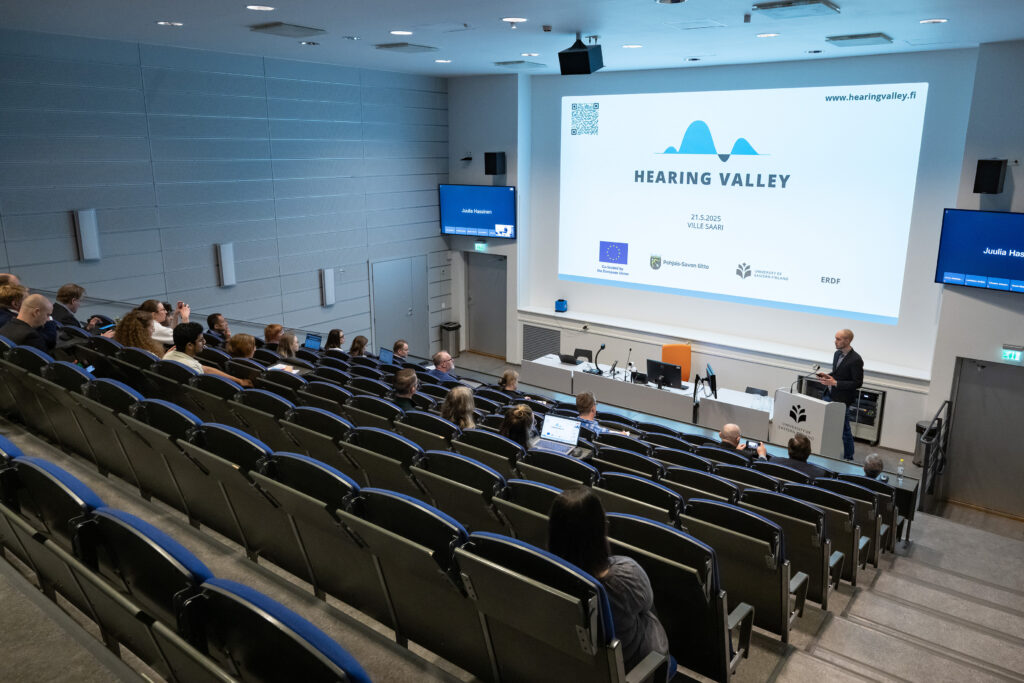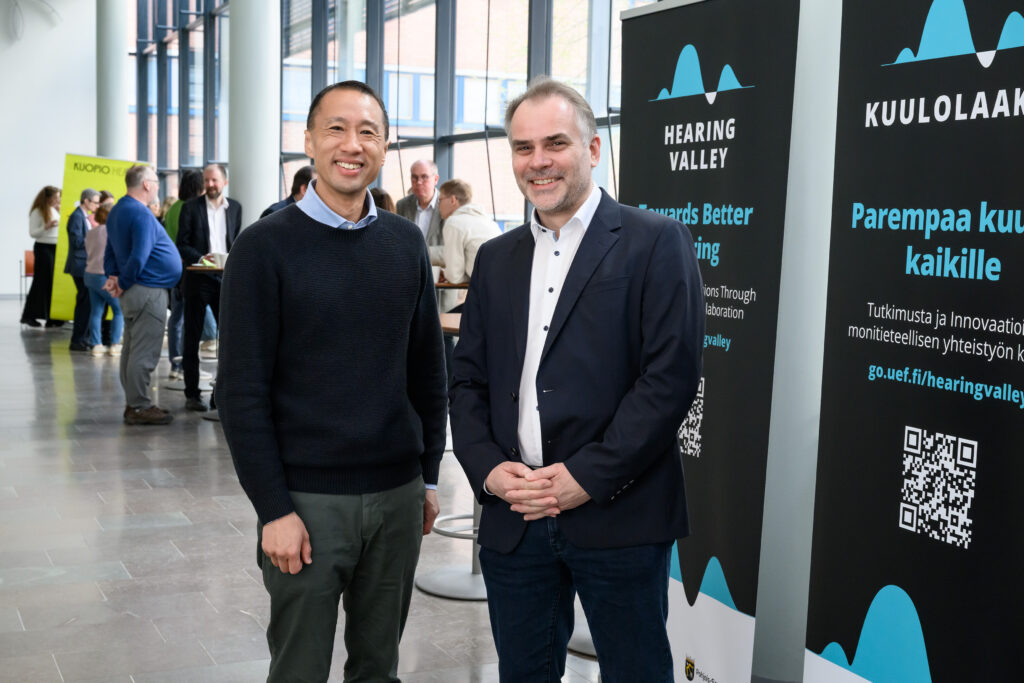Hearing care also helps protect memory – hearing and brain researchers join forces
“Investing in hearing care can also help prevent memory disorders,” Professor Aarno Dietz pointed out in a workshop organised by the Hearing Valley project and the UEF Brain Research Unit this May.
Hearing impairment is particularly common, yet often inadequately treated, among older adults. When left untreated, it increases the risk of falls, depression and social isolation, as well as the risk of cognitive decline. According to the WHO, every dollar invested in hearing care yields a societal return of sixteen dollars in saved costs.
The two-year Hearing Valley project, funded by the European Regional Development Fund, is in the process of setting up a laboratory for applied hearing research on the Kuopio Campus. The University of Eastern Finland, Kuopio University Hospital (KUH) and several companies are jointly developing the laboratory’s services to meet the needs of hearing care research and development. The goal is to accelerate the development and implementation of hearing care innovations for everyday patient care.
Multidisciplinary research collaboration spanning from acoustics to novel treatment methods and technologies constitutes a key component in the project. “Hearing impairment may involve several underlying factors that we don’t fully understand yet. We need further research into biological, genetic and environmental factors, and in order to develop increasingly accurate diagnostic methods,” added Dietz, who works as the Chief Physician of the Sense Organ Diseases Unit at KUH.
According to Ville Saari, Project Leader for the Hearing Valley project, the new hearing research laboratory scheduled to open in the university’s facilities this autumn will enable hearing testing and hearing aid adjustments in various realistic acoustic environments. “EEG measurements and pupillometry will also provide insight into patients’ brain activity and cognitive load during testing.”
The project is also developing a business ecosystem around hearing care and making hearing-related patient data available to researchers via the Biobank of Eastern Finland. “We are also assessing educational needs related to the topic.”

Tailored hearing rehabilitation
“At KUH, we see around 1,000 patients with hearing issues annually, and this offers unique opportunities for scientific research and real-world testing of technology,” Dietz said.
Dietz’s research group has contributed to improving the safety of cochlear implant therapy and developed a Finnish speech-in-noise test that is currently in clinical use. In collaboration with researchers from the national GeneCellNano flagship, the group is now investigating gene therapy for the inner ear, and with the UEF Brain Research Unit, they are studying the effects of hearing rehabilitation on cognition.
“One in three of those entering hearing rehabilitation already has or is suspected to have cognitive decline. This can hinder rehabilitation, such as the adoption of technology, so tailored hearing rehabilitation solutions are needed for these patients,” Dietz noted.
Professor Alina Solomon of the UEF Brain Research Unit referred to a Lancet Commission report indicating that 45% of dementia cases could be delayed or prevented by addressing various risk factors, with hearing impairment identified as a risk factor that is significant, yet treatable.
A multidomain lifestyle programme targeting several risk factors at once has proven effective at preventing memory disorders. Developed in Finland, the FINGER programme is already being applied globally, with hearing screening as a recent addition. “The idea is for hearing care to be included in the programme for those who need it, as soon as we get more research data to support this,” Professor Miia Kivipelto noted.
Hearing impairment may increase the risk of memory disorders in various ways
In the US-based ACHIEVE study, participants with hearing impairment and risk factors for memory disorders were followed up for three years, during which they participated in a hearing rehabilitation intervention. Intervention participants had 48% less cognitive decline than controls.
“However, this effect was not observed, within that follow-up time, among participants who initially had fewer risk factors for memory disorders,” said Professor Frank Lin of Johns Hopkins University, one of the principal investigators of the study.
Participants received hearing aids and other assistive listening devices, as well as counselling for, e.g., communication.
In Kuopio, Lin presented the background and implementation of the project, as well as as-yet-unpublished results showing that hearing rehabilitation had measurable effects on the brain. And not only that, but it also reduced falls, fatigue and loneliness.
Hearing impairment may increase the risk of memory disorders because the effort required to understand speech puts a strain on the brain. Furthermore, a lack of auditory stimuli may accelerate brain degeneration, and reduced social interaction due to hearing loss also takes a toll. “All of these factors likely play a role, and hearing rehabilitation may reduce the risk through all of them.”

Hearing health is a lifelong concern
“Hearing is vital for connection, participation and healthy ageing. Everyone’s hearing declines with age, but help is often sought after a long delay. Hearing aids are typically considered only when people reach their seventies, by which time their hearing may have been declining already for some twenty years,” Lin noted.
According to him, it is important to raise awareness of hearing health being a lifelong concern and something that can be actively looked after. “Just as people now monitor their step count or blood pressure, in the future they will be monitoring their hearing. Protecting and enhancing hearing with various assistive devices will become a routine part of life,” Lin envisioned.
In the workshop, Professor Jari Kaipio presented research approaches of the Department of Technical Physics into sound and acoustics. Corporate insights into the Hearing Valley project were shared by Teemu Koski from Cochlear, Marko Takanen from MED-EL and Aki Mäkivirta from Genelec. In addition, Development Manager Kimmo Solehmainen discussed the opportunities offered by the Kuopio Health innovation ecosystem, while Head of Services Kaisa Unkila outlined the role of Neurocenter Finland in advancing research and innovation.
The article is written by Ulla Kaltiala, Communications Specialist at the University of Eastern Finland, and it is published on the University of Eastern Finland website. Photographs used in the article are taken by Raija Törrönen, Visual Designer at the University of Eastern Finland.
